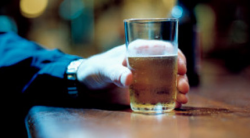Heavy Alcohol Use May Increase Prostate Cancer Risk
Men who drink alcohol heavily and on a regular basis may be putting themselves at increased risk for prostate cancer, according to a new study published in Cancer, the American Cancer Society’s peer-reviewed medical journal. The study also found that heavy alcohol use may diminish the possible preventive properties of finasteride, a drug that has been shown to reduce the risk of prostate cancer in some men.The findings are based on data from the Prostate Cancer Prevention Trial (PCPT), a National Cancer Institute study of the possible benefits of finasteride, a drug that had been used primarily to treat men with enlarged prostates to help them urinate freely (Proscar) and male pattern baldness (Propecia). That study found finasteride reduced the prostate cancer rate by 25%.
Researchers are still watching the men in the study. Follow-up research using PCPT data, such as this study, is also underway.
In this study, University of California researchers evaluated the alcohol consumption and drinking patterns of 10,920 men who were enrolled in PCPT. The researchers were looking for relationships among the amount, frequency, and type of alcohol each man drank and his risk of developing prostate cancer.

Prostate cancer may be one of the problems caused by heavy alcohol use. .
Men who drank 50 grams or more of alcohol per day were at an increased risk of developing high-grade prostate cancer. High-grade prostate cancer is the most aggressive form of the disease. (For more information on tumor grade and staging, see this document.)
Fifty grams is roughly equivalent to 4 beers (1 beer = 12.96 grams of alcohol) or 4 glasses of wine (1 glass of wine = 12.35 grams of alcohol) or 3.5 drinks of liquor (1 serving of liquor = 13.93 grams of alcohol).
Men who drank heavily on 5 or more days per week were also at a significantly higher risk of aggressive disease, the data showed. Heavy beer drinking seemed to be associated with higher risk compared to heavy drinking of wine or liquor, but that may be because more men drank beer than other types of alcohol.
These results differ from those of other studies looking at alcohol intake and prostate cancer risk. The researchers say more studies are needed to confirm their findings.
Taking finasteride appeared to lower the risk of low-grade cancers in some of the light drinkers, but had little effect on the heavier drinkers, possibly because alcohol cancels out finasteride’s preventive effects. The authors suggest this may be because alcohol interferes with certain enzymes needed for the body to process the drug. More research in this area is needed.
If you are taking finasteride to decrease your prostate cancer risk and drink alcohol regularly, talk to your doctor about whether you should still be taking the drug. It has some difficult side effects, such erectile dysfunction and loss of interest in sex.
If you drink alcohol regularly, consider cutting back. Although the link to prostate cancer isn’t entirely clear, drinking alcohol does raise the risk of several other types of cancer — pharynx (throat), larynx (voice box), esophagus, liver, breast, and possibly, the colon and rectum. The American Cancer Society recommends you limit yourself to no more than 1 drink per day for women and 2 drinks per day for men.
What counts as a drink?
- 12 ounces of beer
- 5 ounces of wine
- 1.5 ounces of 80-proof distilled spirits
Talk to your doctor about other lifestyle choices that can reduce your risk of cancer, including eating a healthy diet, getting regular exercise, maintaining a healthy weight, and getting regular cancer screenings.
source: American Cancer Society
